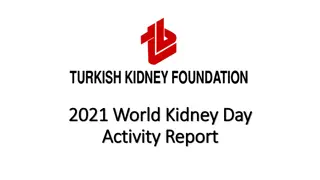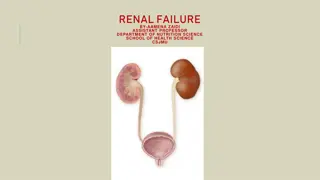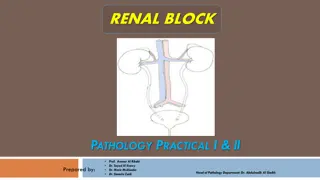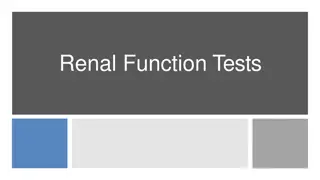Understanding Kidney Disease and Health in India
Chronic kidney disease (CKD) is prevalent in India, with one in every 10 adults affected. The kidneys play vital roles in regulating the body, such as filtering waste and balancing fluids. Diabetes, high blood pressure, and family history are common risk factors for kidney disease. Recognizing symptoms like changes in urination, swelling, fatigue, and itching is essential. Common kidney disorders include cysts, stones, and urinary infections. Regular screenings and healthy lifestyle choices are crucial for kidney health.
Download Presentation

Please find below an Image/Link to download the presentation.
The content on the website is provided AS IS for your information and personal use only. It may not be sold, licensed, or shared on other websites without obtaining consent from the author. Download presentation by click this link. If you encounter any issues during the download, it is possible that the publisher has removed the file from their server.
E N D
Presentation Transcript
KIDNEY DISEASE IN INDIA One in every 10 adults in India suffers from chronic kidney disease (CKD), and at any given point, nearly five lakh patients are in need of life-long dialysis or transplant, according to Sanjay K. Agarwal, Professor and Head of Nephrology, AIIMS. The National Kidney Foundation of India estimates that 100 people in a million suffer from kidney ailments in India
KIDNEY The kidneys are bean - shaped organs that serve several essential regulatory roles. The kidneys are a pair of organs located in the back of the abdomen. Each kidney is about 4 or 5 inches long -- about the size of a fist. There are two kidneys, each about the size of a fist, located on either side of the spine at the lowest level of the rib cage. Each kidney contains up to a million functioning units called nephrons
IMPORTANCE OF KIDNEY The kidneys are powerful chemical factories that perform the following functions: Kidneys filter extra water and wastes out of your blood and produce urine Remove waste products from the body Balance the fluids in the body Release the hormones that regulate blood pressure Produce an active form of Vitamin D that promotes strong and healthy bones
CAUSES OF KIDNEY DISEASE Anyone can develop kidney disease, regardless of their age. The main risk factors for developing kidney diseases are: Diabetes High blood pressure Cardiovascular (heart and blood vessel) disease A family history of kidney failure
COMMON SYMPTOMS OF KIDNEY DISORDERS Changes in urination More or less urination than usual, changes in the color of urine, foamy or bubbly urine Swelling of the feet, ankles, hands, or face Fluid the kidneys can't remove stays in the tissues Fatigue or weakness due to build-up of wastes Shortness of breath Because the excess fluid can build up in the lungs Itching waste build-up in the body can cause severe itching, especially in the legs Loss of appetite Nausea and vomiting
COMMON KIDNEY DISORDERS Common kidney problems include Cysts Stones Urinary Infections
ROLE OF INDIVIDUAL COMPONENTS COMPONENTS COMMON NAMES ROLE IMAGE Emblica officinalis Amla Considered as the stonebreaker Given to avoid burning urination Crataeva nurvala Varun The herb neutralizes the enzyme responsible for stone formation and reduces the production of stone forming chemicals by the body. Tribulus terrestris Gokshur Gokshura works as diuretic which makes Gokshura as a good choice for body that has tendencies of fluid retention Saxifraga ligulata wall Pashanbheda The word Pashanbheda, made of two words, Pashan, which means stone and Bheda, which means breaker, has a special place in Ayurveda as it is a main drug for stones formed in kidney and urinary bladder.
ROLE OF INDIVIDUAL COMPONENTS COMPONENTS COMMON NAMES ROLE IMAGE Tinospora cordifoilia Giloe Described as the one who protects the body against diseases . It is a rejuvenator that enhances the healing process and immunity. Phyllanthus niruri Bhumi amla Interferes with the different stages of stone formation, reduces crystal aggregation Swet parpati Painful urination is relieved It helps in treatment as well as prevention of urinary tract infections Urinary calculi can also be treated very well It soothes down irritation, itching, and burning sensation in the urinary organs
Use : Ayurvedic product effective in urinary diseases and renal calculi DOSE & DURATION : One capsule thrice daily EXCLUSION CATEGORY : Not to be given to those below 18 years of age Can be given to pregnant women only on doctor s suggestion.
PRESENTATION DETAILS Presentation 60 s capsule in a bottle pack MRP DP BV PV Rs.645 Rs.550 330 20.63
SUMMARY Ideal treatment for kidney stones with the following advantages : Considered as the stonebreaker The herb neutralises the enzyme responsible for stone formation and reduces the production of stone forming chemicals by the body. Works as diuretic which makes it a good choice for body that has tendencies of fluid retention Contains important ingredients for treating stone in kidneys and urinary bladder It is a rejuvenator that enhances the healing process and immunity. Interferes with the different stages of stone formation, reduces crystal aggregation and modifies their structure and composition

















































